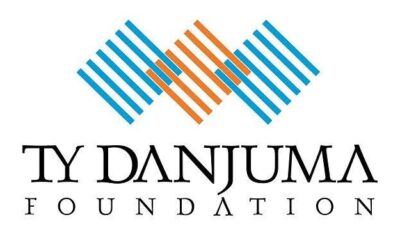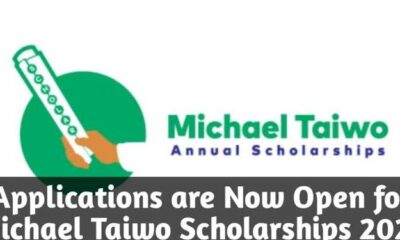EDITORIAL
VeryDarkMan’s Arrest and the Headless Mob: Misinformation’s Threat to Nigeria’s Stability

On May 2, 2025, Martins Vincent Otse, better known as VeryDarkMan (VDM), was detained by the Economic and Financial Crimes Commission (EFCC) in Abuja, igniting a volatile reaction across Nigerian social media. The arrest followed VDM’s visit to a Guaranty Trust Bank (GTBank) branch to address unauthorized deductions from his mother’s account, prompting his supporters – affectionately called “Rattels” but who for the purpose of this article I will refer to as the “Headless Mob” – to accuse the bank of orchestrating his detention. This group, characterized by its fervent but often uninformed loyalty, flooded platforms like X with calls to boycott GTBank, close accounts, and protest at branches.
Their reaction, mostly driven by misinformation, exemplifies how unverified narratives can escalate tensions and threaten Nigeria’s peace and security.
The Headless Mob’s response on the arrest of VDM was swift and chaotic. Posts on X falsely claimed GTBank trapped VDM inside its premises to facilitate his arrest, with some alleging complicity between the bank and the EFCC. Some prominent social media users amplified these claims, asserting GTBank ordered VDM’s detention to silence his complaints. Videos of individuals destroying GTBank ATM cards circulated, and hashtags like #FreeVDM trended as supporters vowed to cripple the bank’s operations.
One unverified post claimed over 100,000 accounts were closed within 24 hours, a figure that, while dubious, fueled the narrative of mass revolt. GTBank’s release of CCTV footage showing VDM leaving the branch before his arrest was largely ignored, overshadowed by the emotional pull of the Headless Mob’s outrage.
Misinformation thrives in Nigeria’s low-trust environment, where only 23% of citizens trust financial institutions, according to a 2023 Edelman Trust Barometer.
For the uninformed, VeryDarkMan is a Nigerian social media activist known for his outspoken criticism of institutions and individuals who has faced multiple legal battles due to his activism. His confrontational style has led to allegations of cyberstalking, defamation, and financial misconduct. In May 2024, he was arraigned on five counts of cyberstalking after allegedly harassing the Nigeria Police Force and Nollywood actresses Iyabo Ojo and Tonto Dikeh online. Another notable incident occurred in June 2024, when he was arrested for allegedly defaming an individual accused of scamming a Nigerian abroad. His lawyer claimed that instead of investigating the alleged scammer, the police arrested VeryDarkMan for exposing the situation. This sparked debates about the role of social media activism in holding individuals accountable versus the risks of defamation and also highlighted the tension between digital influence and legal accountability in Nigeria.
Beyond legal troubles, VeryDarkMan has also been criticized for his approach to activism, which some view as aggressive and controversial. In October 2024, he was arrested for wearing a police uniform in a video, an act that authorities deemed unauthorized and misleading. His March 2025 arrest for alleged defamation of gospel singer Mercy Chinwo further fueled debates about the limits of free speech and responsible activism. While his supporters argue that he is exposing corruption and injustice, critics believe his methods often cross ethical and legal boundaries. His repeated arrests and legal confrontations illustrate the complexities of social media activism, where influence can both empower and provoke significant consequences.
Owing to his activism via social media platforms, VDM has built a following of millions who view him as a voice against elite malfeasance. His recent arrest, officially tied to cyberstalking and defamation charges, was framed as retaliation for exposing GTBank’s alleged misconduct. The EFCC’s initial silence and GTBank’s delayed response created a vacuum that misinformation filled. As I noted in my 2024 article on fake news titled, ‘Fake News: Detecting & Stopping the Spread’, “Social media’s speed amplifies unverified claims, turning half-truths into rallying cries before facts can catch up.”
This dynamic was evident as the Headless Mob’s narrative of corporate conspiracy outpaced evidence, driving calls for economic disruption.
The Headless Mob’s threats against GTBank highlight the broader danger of misinformation-driven movements. Their calls for mass account closures and protests risked destabilizing Nigeria’s banking sector, which handles over ₦1.2 trillion in daily transactions, per 2024 Central Bank of Nigeria data. Such actions could erode public confidence in financial systems, a critical concern in a nation where 36% of adults remain unbanked. The rhetoric of violence – posts urging supporters to “make GTBank feel it” – echoed past instances of social media-fueled unrest. In 2020, the #EndSARS protests, initially sparked by legitimate grievances, were hijacked by misinformation, leading to looting and over 70 deaths.
Nigeria’s security is particularly vulnerable to such dynamics, with 62% of its population active on social media, according to a 2024 Statista report. The Headless Mob’s actions reflect a mob mentality where loyalty to a figure like VDM overrides critical thinking.
The EFCC later clarified that VDM’s arrest stemmed from multiple petitions, not solely GTBank’s influence, but this came too late to quell the initial uproar. As I warned in that article on Fake News, “When misinformation spreads unchecked, it weaponizes emotions, turning followers into foot soldiers for chaos.” This risks escalating digital outrage into physical confrontations, especially in a country grappling with 33,000 annual deaths from communal violence, per 2024 Institute for Peace and Conflict Resolution data.
Social media platforms like X and Facebook amplify this threat through algorithms that prioritize engagement over accuracy. A 2023 study by the Centre for Democracy and Development found that 68% of Nigerians encounter false information on social media weekly, yet only 19% verify sources before sharing.
The Headless Mob’s rapid mobilization – protests erupted at GTBank’s Abuja headquarters within 48 hours – demonstrates the power of social media outlets like X and Facebook to galvanize but also its role in spreading unverified claims. The platforms’ failure to flag inflammatory posts, such as those inciting bank runs, underscores the need for stricter content moderation.
To avert these dangers, Nigeria must tackle misinformation at its roots. Institutions like the EFCC and GTBank must communicate promptly and transparently to preempt speculative narratives. The EFCC’s delayed clarification and GTBank’s slow release of CCTV footage allowed falsehoods to dominate. Public education is equally critical: a 2024 UNESCO report found that digital literacy programs could reduce misinformation sharing by 41%. Platforms like X and Facebook must also enhance mechanisms to flag false content, particularly when it risks economic or social harm.
Finally, influencers like VDM bear a responsibility to temper their rhetoric, as their words can ignite followers primed for action.
The detention of VeryDarkMan and the Headless Mob’s reaction serve as a stark warning for Nigeria. While supporters see themselves as defenders of justice, their misinformation-fueled actions threaten the stability of critical institutions and public safety. The Headless Mob’s campaign against GTBank, rooted in unverified claims, risks spiraling into broader unrest in a nation already strained by economic and ethnic tensions. As I stated in the aforementioned article, “Fake news is not just a lie; it’s a spark that can burn down trust and peace.”
Nigeria must act swiftly – through institutional transparency, digital literacy, and platform accountability – to ensure misinformation does not become a catalyst for chaos.
By Mayor Ikoroha
Mayor Ikoroha is a Media Consultant and Editor-in-Chief of AAMagazine
Discover more from Asiwaju Media
Subscribe to get the latest posts sent to your email.
-

 NEWS6 days ago
NEWS6 days agoPastor Paul Enenche Rejects ₦30 Million Donation From Kebbi Government During Crusade
-
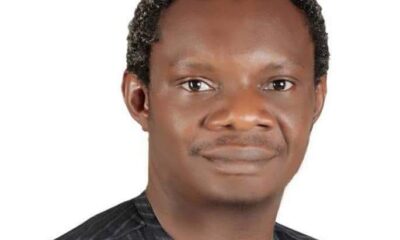
 POLITICS2 days ago
POLITICS2 days agoEbonyi Rep Member Threatens Constituent for Supporting Charity Foundation
-

 NEWS6 days ago
NEWS6 days agoTinubu Blasts IGP Egbetokun Over Failure to Arrest Benue Killers
-

 POLITICS5 days ago
POLITICS5 days agoTight Security In Uyo As Tinubu Set To Attend Governor Umo Eno’s Grand Welcome Into APC
-

 NEWS7 days ago
NEWS7 days agoPresident Tinubu Visits Hospitalized Victims of Benue Massacre
-

 INSIDE NYSC4 days ago
INSIDE NYSC4 days agoALGON Chairman Donates Transformer to NYSC Ebonyi Orientation Camp, Ends Years of Power Outage
-
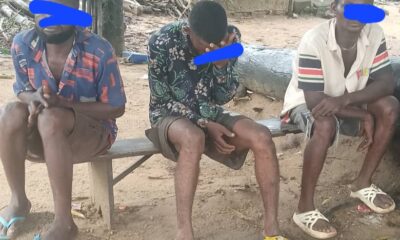
 NEWS1 day ago
NEWS1 day agoCable Vandals Nabbed by Nigerian Hunters in Okpuitumo, Handed Over to Police
-

 JOBS/SCHOLARSHIPS2 days ago
JOBS/SCHOLARSHIPS2 days agoCDCFIB Announces Nationwide Recruitment into Paramilitary Agencies
-
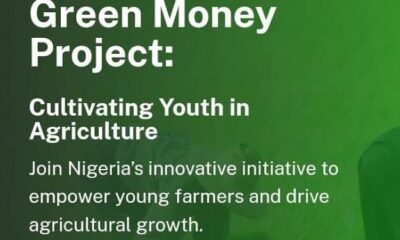
 NEWS5 days ago
NEWS5 days agoCall For Applications: Green Money Project for Nigerian Youth in Agribusiness 2025
-
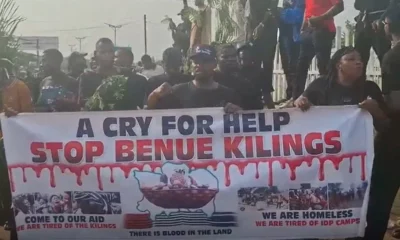
 NEWS5 days ago
NEWS5 days agoSPECIAL REPORT: Nigeria’s Slow Descent into Anarchy; Warnings Ignored, Blood Still Spills
-

 NEWS4 days ago
NEWS4 days agoArmed Herdsmen Attack Benue Community 48 Hours After Tinubu’s Visit
-
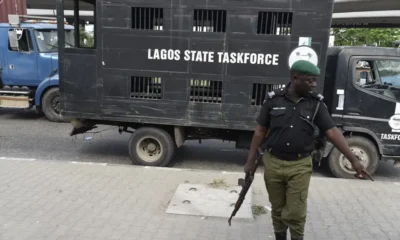
 NEWS4 days ago
NEWS4 days agoLagos Environmental Taskforce Arrests 84 in Agege Clean-Up Operation









